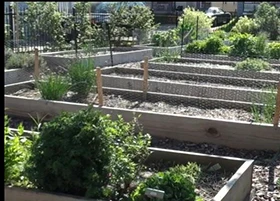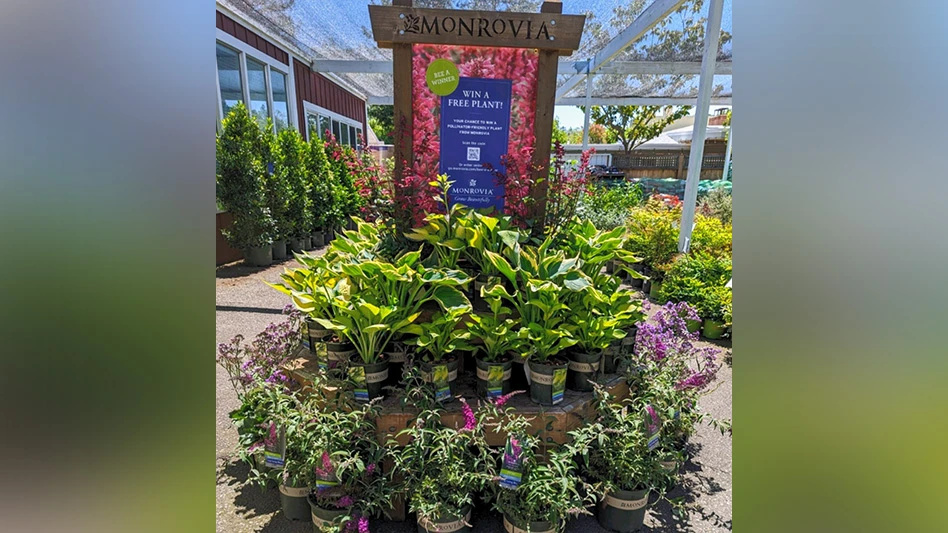
 Tucked inside Chicago's O'Hare International Airport is a community garden. |
In the Chicago O'Hare International Airport there sits a gem that very little of the world knows about. I had no idea it was there until my flight was delayed and I found myself killing time and chatting with a total stranger while sipping some coffee. When conversation got stagnant, I looked past him to find a rather large sign instructing me that just beyond this terminal there was a community garden.
Amazement struck me, and I wondered how is it that millions of people can pass through someplace like this every year and not know about it? All of a sudden I no longer saw O'Hare as a lily pad to leap from on my various adventures from pond to pond; it was also a botanical wonderland. The whole situation made me wonder - how many of these exist right under my very own nose back at home that I don't know about?
Cultivate community: a little history
If you're new to the concept of community gardens, you're not alone! Community gardens were popular back during the Depression. They were outlets for people to go and try to help out the community by putting their own blood, sweat and tears into a helpful cause. In those days, people didn't have money to give out to help the less fortunate, but they did have two hands and big hearts to match. Pair a strong will to help others with the determination to get in touch with nature, add a little bit of soil and sunshine and you've got the makings for a community garden.
Not all community gardens are geared to the less fortunate, however. Some of these gardens are created simple as a way for people to bond over a common interest — growing food. All it takes is one person, a little bit of land and a whole lot of spunk and before you know it, bushels of produce will be hauled away every season. It's beautiful to see how gardening allows people of all ages, races, backgrounds and religions to connect and learn from one another. They break down barriers we build in normal settings and allow us to reconnect with both the Earth and our fellow neighbors, strangers, family and friends.
But where should we create one?
Community gardens don't have to be placed in a strictly agricultural area, as is demonstrated by the one located in O'Hare. You can place them anywhere, such as:
- A vacant lot where an old gas station used to be
- The backyard of a church makes a fantastic place for a congregation to grow
- A park with overgrown perennial or annual beds
- Elementary schools tend to have extra space beyond the soccer fields and playgrounds
- Factories tend to have picnic areas, which can also have gardens incorporated
- Hospitals have excellent garden space and can be seen by people from all walks of life
The key to making a community garden successful is the ability to make the space practical. In the case of an abandoned gas station, typically the land is owned by somebody but not maintained. In many older communities old, gas stations were passed down from generation to generation only to be put out of business by large conglomerations. The owners of these properties may not want to sell the property itself, but at the same time is at a loss as to what to do with the property. If you're charismatic enough, you may be granted the permission to build raised bed structures to grow in. These can easily be removed if the owner changes his or her mind or if the property gets sold. Don't forget to offer the land owner some fresh juicy produce in return! While working with other locations such as a corporate entity like a factory or hospital, find a soft spot in the hearts of the business executives. Chances are if you are to show up and proposition them with free produce and free maintenance of an area of their grounds, they're not going to turn you away!
The free lunch that keeps on feeding
The hand to mouth mentality of a large population of the public has no idea what kind of work goes into cultivating their own crops. As a garden center, speaking with church groups and elementary schools will get your foot in the door and show that you have a genuine interest in the community. Churches tend to be very compassionate, and if you're able to get them interested in gardening, the word will spread throughout their congregation as to how your garden center helped them grow food. Sometimes this food that is grown by churches goes to help families within the church that are less fortunate, sometimes it just gets distributed evenly throughout all who have gotten their hands dirty. Either way, if you raise the awareness of gardening within the churches, you're passing on good vibes that will result in people pulling into your parking lot willing to spend money. When you properly educate the public on what they're doing in the garden, chances are they are going to be able to sustain the garden plots with little to no help from you. You can be the instigator of the positive movement!
Use Newton's Law
An object in motion remains in motion unless acted upon by an outside force. If you're able to excite the community about their public garden space, chances are that same public will want to expand their quest for all things garden related and venture to your store. If you are able to congregate a large enough following of positive plant thinkers, chances are they'll find friends that will want to help, and they'll find friends and so on. Keep that positive inertia going:
- Make sure you place signage in the community garden informing what exactly you've done to help construct and keep it going
- Use public outlets to raise awareness such as the local newspaper. If you're able to get a write-up about something positive, you might open the door to people who otherwise didn't know such a thing existed. Approach the editor with a "story idea," don't try to seem like you're trying to get free advertisement out of it.
- Use your mouth! As dated as it might sound, just speaking with your customers while they're visiting your store can go a long way. Offering the benefit of gardening without having to tear up a home landscape is tantalizing to those who are on a smaller tract of land
- Capitalize on social media. Create pages for the garden itself, and keep your business aspect secondary to the primary layout of the page. Focus on the benefits of the garden and not on trying to get money out of people.
Act Local!
You'd have to have been under a rock for the past couple of years to have overlooked the whole "shop local" trend that is sweeping the nation. To put a meal on the table of an average American family, food must travel somewhere along the lines of 1,500 miles. Think of the apples, tomatoes and lettuces that you enjoy on a regular basis. It would be very easy to use those as selling points to increase interest in a community garden. The broad array of produce that can be grown in different climate zones can vary, and it is downright impractical to try to be 100 percent self sustaining, but you can get pretty close.
Don't hesitate to use your garden center as an epicenter for the movement! Entertaining even just a very small group of local activist with a workshop or presentation will carry you a long way credibility wise. Organizing workshops takes little to no effort and the ripple effect of benefits are incredible. Invite the entire community to these workshops by posting flyers in coffee shops, yoga studios, churches and other highly visible public places. It's imperative, however, to make sure the spotlight is focused on the community garden, not your garden center itself. A small logo at the bottom right corner of the flyer will draw attention, but not stand out and create an uncomfortable "Are they trying to sell me something" vibe.
Workshop ideas can include:
- Can you follow your food to where it came from? Focus on the amount of travel and wasted energy that goes into transportation of food
- Bees please! Teach the public how to take a proactive approach to gardening using beneficial insects.
- Gardening does good! Create a fun, almost game like scavenger hunt around the community doing various good deeds along the way. Hide everything from seed packets to baskets of produce for the hunters to find. Of course, make the end location your store.
- Diet frenzy? No thanks. Teach gardeners how to easily implement fresh foods into their diet for healthier living.
- Lean green growing machine. Instruct about the broad array of organic fertilizers available on the market.
- Cooking with the seasons. Use food harvested from the community garden to demonstrate healthy alternatives to eating out.
Community gardens are a great way to bring a large population into contact with your garden center without seeming pushy or too business like. The laid-back nature of most gardeners is a great vibe to bring into your store. If there is already a community garden movement in your neighborhood, get involved and help them grow. It isn't uncommon for new garden plots to pop up every year. Don't be shy, and don't ever forget, gardening is supposed to be fun!
Nikki Weed is a horticulturalist and professional adventurer who uses her experiences and knowledge to help manage a successful garden center in Greenville, S.C. She can be reached at pepitaweed@gmail.com.

Explore the August 2013 Issue
Check out more from this issue and find your next story to read.
Latest from Garden Center
- This Florida garden center's busiest days are in the fall, not spring. Find out how they do it
- Terra Nova Nurseries releases new agastache variety, 'Peach Pearl'
- The Certified Shopify Online Garden Center provides local retailers with ecommerce tool
- Meet the All-America Selections AAS winners for 2025
- Endless Summer hydrangeas and Suntory Senetti glam up Grammys red carpet
- Ball Seed releases 2025 edition of 'Thrive and Flourish' for landscape and garden retail
- American Floral Endowment's Fred C. Gloeckner Foundation Research Fund accepting grant proposals
- Floral Marketing Fund and CalFlowers partner to advance floral industry





